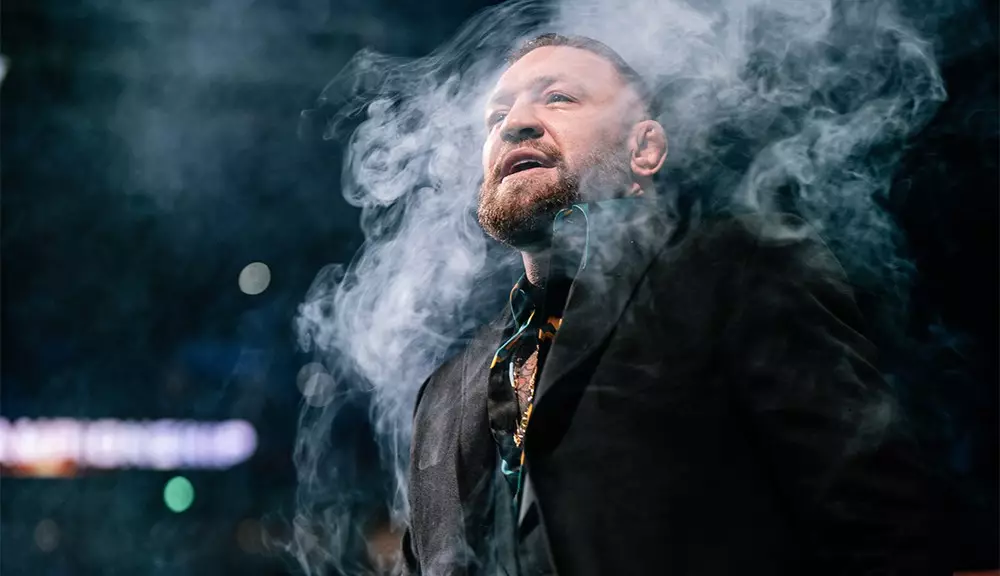Ilia Topuria, the undefeated UFC featherweight champion with an impressive record of 16-0, once looked up to Conor McGregor as a source of inspiration. McGregor, a two-division titleholder, symbolized the pinnacle of mixed martial arts success for many aspiring fighters. However, the once-mighty Irish fighter’s recent struggles—characterized by a series of legal troubles and a significant decline in his fighting career—have left Topuria bitterly disappointed. In a candid reflection on McGregor’s downfall, Topuria expressed his feelings on the “FULL SEND PODCAST,” noting that the fighter who inspired him now embodies values he can no longer respect.
Topuria’s disillusionment is not merely a personal sentiment; it reflects a broader narrative within the sport where athletes grapple with the inherent pressures of fame and success. Conor McGregor, once a paragon of charisma and skill, has succumbed to self-destructive behaviors that starkly contrast the values he once espoused.
In the world of competitive sports, particularly in MMA, the distinction between a sports role model and a cautionary tale can often blur. Topuria’s critique of McGregor is grounded in a sense of moral responsibility that he feels has been disregarded. He stated, “At some point, you fall, you know? The people come against you.” This candor speaks volumes about the pressures athletes face and the scrutiny that accompanies public life. Topuria believes that being an idol comes with the requisite duty of setting a positive example for fans and upcoming fighters. McGregor’s perceived betrayal of these responsibilities has left Topuria questioning the true cost of glory in professional fighting.
As Topuria rises through the ranks, his perspective on success is markedly different. While the Irish fighter embraced a lifestyle that often blurred the lines between celebration and excess, Topuria emphasizes moderation. He recognizes the allure of fame and fortune, but insists that true champions maintain control—an insight born from both admiration for McGregor’s early career and a desire to avoid its pitfalls.
Topuria’s ambitions in the octagon go beyond merely matching McGregor’s legacy; he seeks to redefine it. His meteoric rise—evidenced by decisive victories over legendary fighters like Alexander Volkanovski and Max Holloway—illustrates his capability. Yet, unlike McGregor, Topuria aspires to be a champion who aligns his success with integrity. “I want to be more than Conor McGregor,” he states, clearly setting a tone of renewed aspiration rooted in respect and honor.
This desire to reposition himself as a figure of hope and commitment is refreshing in an industry often marred by negativity and controversy. Topuria expresses a vision not just for his career, but for the future of the sport itself—a future where athletes prioritize their well-being while striving for greatness. His recent ambitions include a potential superfight against lightweight champion Islam Makhachev, a matchup he believes he could win decisively. Such aspirations indicate that Topuria is not only focused on building his legacy but is seriously entertaining the possibility of transcending it.
Ilia Topuria embodies the emergence of a new generation of fighters. While McGregor’s storyline serves as a cautionary tale, Topuria’s trajectory represents vitality, ambition, and a strategic approach to success. The 28-year-old is harnessing his global appeal, evidenced by appearances at notable events, like carrying the UFC title onto the pitch at Santiago Bernabéu. Topuria’s ambitions to host a UFC event in Madrid highlight a profound understanding of the sport’s cultural impact and the role athletes play in shaping it.
Furthermore, Topuria’s thoughts on the nature of his stardom amplify his intent to cultivate a positive legacy: “I may not be as well-known as he was, but the way they know me won’t come with negativity.” This sentiment reveals a commitment to building an identity rooted in respect, discipline, and excellence—a powerful reminder to fans and competitors alike that true legacy is built over time and through principled actions.
As current champions and contenders grapple with the evolving landscape of MMA, the emergence of fighters like Topuria may serve as a much-needed shift. His commitment to maintaining core values while striving for greatness stands as an antidote to the turbulent trajectory many have taken before him. While McGregor may forever be a part of this conversation, Topuria is paving a different path—one that champions honor, integrity, and the enduring spirit of competition.
In a sport that is often scrutinized for its palatable theatrics, Topuria’s rise offers a glimmer of hope and sophistication—an opportunity to redefine what it means to be an MMA champion in the modern era.

